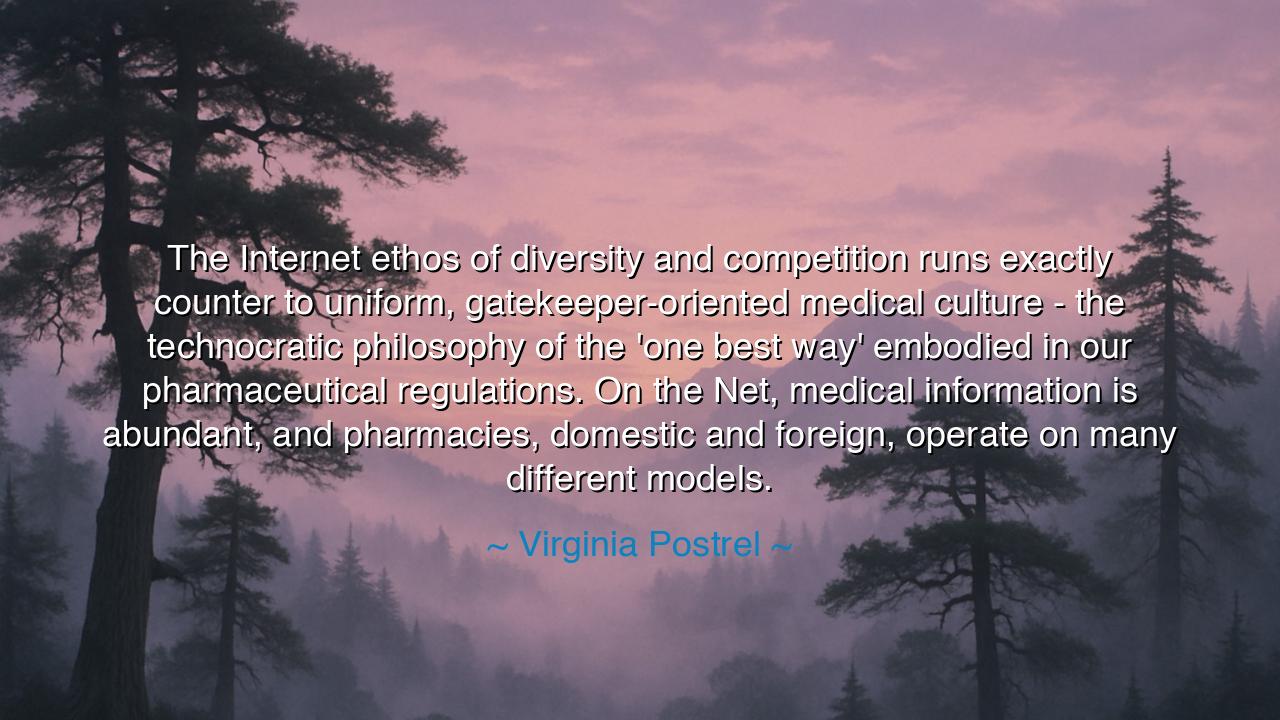
The Internet ethos of diversity and competition runs exactly
The Internet ethos of diversity and competition runs exactly counter to uniform, gatekeeper-oriented medical culture - the technocratic philosophy of the 'one best way' embodied in our pharmaceutical regulations. On the Net, medical information is abundant, and pharmacies, domestic and foreign, operate on many different models.






When Virginia Postrel declared, “The Internet ethos of diversity and competition runs exactly counter to uniform, gatekeeper-oriented medical culture — the technocratic philosophy of the ‘one best way’ embodied in our pharmaceutical regulations. On the Net, medical information is abundant, and pharmacies, domestic and foreign, operate on many different models,” she spoke as one who had seen the clash of two worlds — the old and the new, the controlled and the free, the few and the many. Her words are not merely about medicine or technology; they are about power, freedom, and the eternal tension between order and innovation. In them, she captures a truth that echoes through all ages: that whenever knowledge multiplies and spreads beyond the grasp of the few, the world trembles and changes forever.
In the ancient world, knowledge was often kept behind temple walls. The priests of Egypt guarded their medical secrets, and the philosophers of Greece passed wisdom through chosen disciples. It was thought that truth could not be entrusted to the common man — that it required gatekeepers to preserve purity and prevent chaos. But each age produces rebels who break those gates. Just as Gutenberg’s press shattered the monopoly of the Church over knowledge, so too has the Internet shattered the monopoly of institutions over information. Postrel sees this not as a corruption, but as a liberation — the triumph of curiosity over control, the many voices rising against the single doctrine of the “one best way.”
Yet her message is not a blind celebration of chaos. She does not deny the need for standards or safeguards; rather, she warns that when authority becomes rigid — when it silences all alternatives in the name of safety — it becomes tyranny disguised as order. The medical establishment, with its hierarchies and regulations, was built upon noble intent: to protect the sick from falsehood, to ensure that treatment is sound. But over time, it hardened into a fortress, slow to adapt, fearful of innovation from outside its walls. The Internet, in contrast, is a wild sea of ideas — dangerous, yes, but fertile with discovery. In this, Postrel calls us to remember that wisdom is not born in silence, but in dialogue, not in restriction, but in exchange.
Her words recall the story of Andreas Vesalius, the Renaissance anatomist who defied the ancient teachings of Galen. For centuries, Galen’s writings had ruled European medicine as absolute truth, and to question him was heresy. Yet Vesalius dared to look with his own eyes, to dissect the human body, and to teach from what he saw, not what he was told. His findings, published in De Humani Corporis Fabrica, overturned a thousand years of dogma. In his time, Vesalius was what the Internet is to ours: a force of disruption, a voice crying that truth cannot be monopolized. The technocratic philosophy of “one best way,” whether in ancient manuscripts or modern regulation, always fears such voices — for they remind the powerful that truth is not theirs to keep.
Postrel’s insight also speaks to the moral question of trust. Who shall we trust — the expert behind the gate, or the multitude beyond it? The answer, as the ancients would say, lies in balance. Blind faith in authority leads to stagnation; blind faith in the crowd leads to confusion. The wise must walk between these worlds — learning from the abundance of the Internet, yet discerning truth from illusion; respecting expertise, yet never surrendering the right to question. This is the eternal duty of the thinking soul: to seek knowledge with humility, and to test every claim with reason.
Her words also remind us of the power of diversity — that strength arises not from uniformity, but from the meeting of differences. Just as ecosystems thrive on variety, so too does human progress depend on competing ideas, on the friction between old methods and new. The Internet, in its boundless reach, embodies this principle: it allows the healer in India, the researcher in Canada, and the patient in Nigeria to share and learn without permission. It creates what the ancients might have called a marketplace of wisdom, where truth emerges not from decree, but from the living conversation of humanity itself.
Thus, the lesson of Postrel’s words is both profound and practical: do not fear abundance, but learn to navigate it with discernment. Let not the guardians of tradition suppress the birth of new thought, nor let the seekers of freedom reject the discipline of truth. In your own life, when faced with the choice between safety and curiosity, remember that growth demands both caution and courage. Ask questions, seek many perspectives, and hold no authority — not even your own — as infallible. For the Internet, like life itself, is a mirror of the world’s mind: chaotic, wondrous, dangerous, and endlessly creative.
So let this be remembered: wisdom does not dwell behind gates. It lives in the shared striving of countless souls who dare to learn, to speak, and to challenge. As Virginia Postrel teaches, the age of the “one best way” must yield to the age of many paths — where truth is not a treasure hoarded, but a river that flows freely for all who thirst. To drink deeply from that river is to join the great tradition of seekers, from the philosophers of Athens to the innovators of today — those who understand that the path to enlightenment begins not in obedience, but in the courage to explore.






AAdministratorAdministrator
Welcome, honored guests. Please leave a comment, we will respond soon